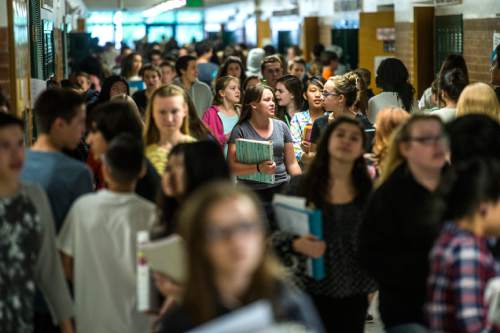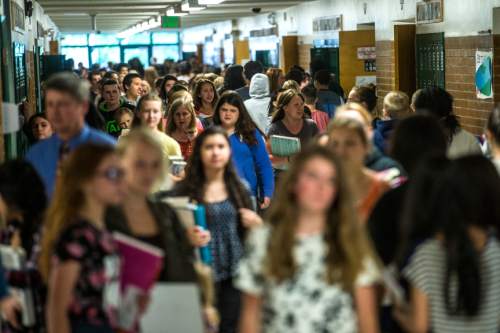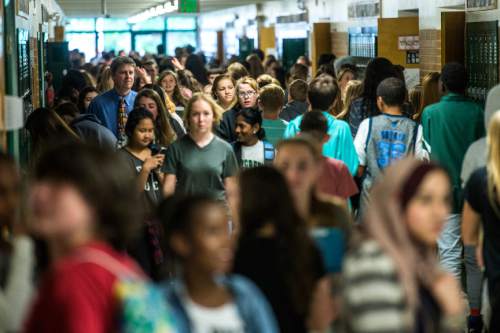This is an archived article that was published on sltrib.com in 2015, and information in the article may be outdated. It is provided only for personal research purposes and may not be reprinted.
Utahns in large numbers support substantial increases in spending on public and higher education, a new poll shows.
Nearly 78 percent of residents surveyed by Envision Utah favor significant and strategic hikes in investments for education, aimed at putting the state in the top 10 in the U.S. for academic performance.
Residents overwhelmingly back a scenario calling for a 5 percent bump in school spending per year through 2020. Four of every 5 Utahns support the poll's top spending model, compared to fewer than 1 in 5 who instead back a more moderate increase of 3.4 percent yearly. Only 6 percent want no additional education investments.
The survey also highlights education as ripe for political action in Utah.
Residents rank the issue among the most important facing the state, while also faulting elected leaders for not performing well on it thus far. Only air quality had a higher gap in Envision Utah's poll between the sense of public importance it deserves and actual confidence that leaders are tackling the issue adequately.
"The public is saying, 'We want this improved — and now,' " said Robert Grow, CEO for Envision Utah, a nonprofit regional-planning group.
With Utah's economy recovering from the Great Recession and support for new school spending on the rise among government and business leaders, Grow said, "Now is the opportunity. You're seeing the stars line up."
Utah is last in per-pupil spending, while its school enrollment continues to swell.
Indicators of healthy public backing for Utah's public schools, colleges and universities are not new, but the latest survey, completed in May, reflects one of the largest outreach efforts of its kind in state history.
More than 52,845 Utahns participated in the online and phone survey campaign dubbed "Your Utah, Your Future." The poll is meant to gauge public sentiment on 11 key issues in light of projections that Utah's population is expected to double to about 5.4 million residents by 2050.
"What Utahns are telling us is, we don't want the status quo in 2050," said Martin Bates, superintendent of the Granite School District. "Our current vector is not going to take us where we want to be. We've got to do something different to have the future we want."
The survey shows Utahns support a long-term plan for "wise" spending of new cash for schools. Those added investments would go to teacher pay and training; better early-childhood education; development of standards and metrics for measuring school progress; improving students' math and reading skills; and increasing collaboration among families, schools, teachers and community members.
While respondents support using state budget surpluses to boost education spending each year, they also support additional taxes to pay for better schools.
Seventy-one percent of Utahns are at least somewhat willing to raise taxes short term to enhance education. That support dips to 66 percent when residents are faced with spending less on other priorities, such as roads and water projects, to raise education cash.
One state business leader argues that Utahns support a short-term tax hike for education partly because they understand the long-term benefits it would bring. "This is self-interest," said Scott Anderson, president of Zions Bank. "We want education because it will give us a better economy and make us more prosperous as individuals."
Indeed, the poll finds that Utahns are motivated in their backing of extra spending on schools, colleges and universities from two main perspectives. They view it as beneficial to their own individual advancement and increased economic opportunity, but also, the survey says, as "developing a better, safer community with better citizens."
Poll respondents call for more funding of colleges and universities to make higher-education degrees more affordable and to ensure that students can complete their degrees in a timely manner.
Such views mirror a set of priorities recently adopted by the Utah Board of Regents, which oversees the state's higher-education system.
Affordability and access will be key drivers as the board shapes its latest budget request to the Legislature, according to Commissioner of Higher Education Dave Buhler.
While tuition rates in Utah are competitive compared with surrounding states, "we're not as affordable as we once were," Buhler said. "And it's important that we keep it affordable."
Twitter: @TonySemerad —
Envision Utah poll
• 78 percent support "significant, strategic" investment increases in education for public and higher-education systems ranked among the nation's best.
• 17 percent back "moderate, strategic" investment hikes, with moderate improvements in school performance.
• About 6 percent want no investment increases and no long-term strategy for education resulting in declining school performance.
Source: Envision Utah's "Your Utah, Your Future" poll







